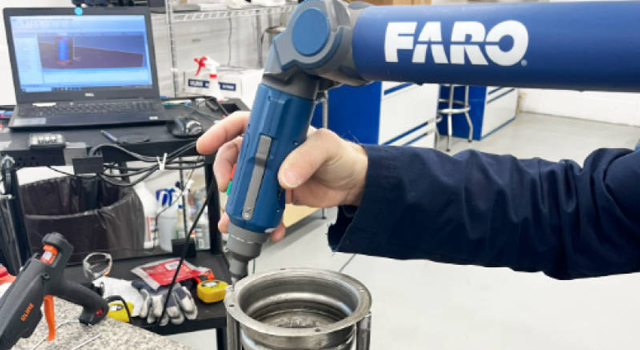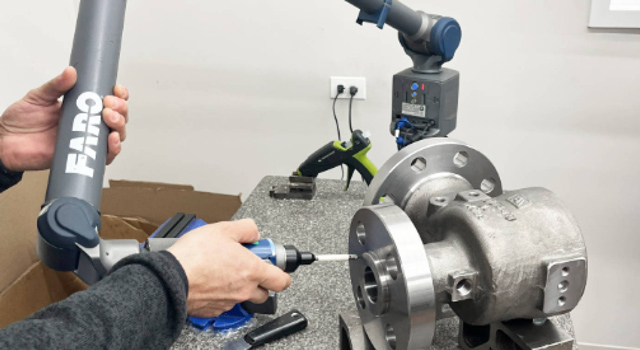With a focus on metal spinning—shaping metal sheets or blanks into cylindrical or conical shapes using a lathe—the company has four FARO arms. Three of them have the mounted laser scanner and 8-axis rotational accessory. Helander uses FARO’s technology to help build large components for telecommunications, rockets, jets, helicopters, and additional applications. (Due to U.S. International Traffic in Arms Regulations (ITAR) regulations, Coglianese is unable to go into additional detail.)
Thanks to FARO’s scan-arm technology, Coglianese estimates that his team has doubled or tripled the speed at which they work. It’s a time savings that really adds up, because it allows the company to increase its throughput and acquire more new business, faster—all while reducing rework, waste, and scrap.
In addition to metal-spinning applications, Helander also uses its scan arms for reverse engineering, especially when a component on one of their machines breaks down. The company will scan a part and then try to determine what the original size and shape was and whether or not they’re able to manufacture new ones instead of ordering new components. Coglianese estimates that on one particular occasion there was a $50,000 piece of bronze that was reverse engineered and, because of that, could be made in-house.

Academia within arm’s reach
Published: Tuesday, February 13, 2024 – 12:02
“Many of our parts have profile callouts (which controls cylindricity), so we utilize laser scanning to compare the finished part to the CAD model and evaluate the accuracy of the profile,” Coglianese says. ”We must ensure the thickness and profile requirements are maintained throughout each step of production. Depending on how many spinning and machining operations there are, parts are checked multiple times throughout the process to verify they meet their tight tolerance requirements.”
Speed, efficiency, productivity, and progress
Quality Digest does not charge readers for its content. We believe that industry news is important for you to do your job, and Quality Digest supports businesses of all types.
Founded in 1936, Helander has come far from its humble beginnings. Today the company of 40-plus employees headquartered in Lombard, Illinois, a Chicago suburb, specializes in metal spinning, sheet hydroforming (the process by which hydraulic pressure is applied to a sheet of metal, which causes it to deform and take on the shape of a die and is used to create auto body panels, aerospace components, and appliance casings) and machining, with a focus on aerospace, energy, and commercial/industrial machinery and equipment industries. Helander works with companies big and small, including leaders in the aerospace industry. On average, the company has close to 100 new projects per year.
For Helander, an industry leader in metal-forming and metal-fabricating services for more than 80 years, the key to recruiting top talent is less about resisting or reversing these trends, but rather shifting the conversation entirely. In other words, how do we again make manufacturing an exciting field in which one may build a career.
• A post-pandemic desire for greater work-life balance (enabled in part by remote work flexibility) that reestablishes more mid-20th century 9 a.m. to 5 p.m. working hours
The reasons behind the skills gap are varied. But the primary drivers are:
• Industry misconceptions that promote the idea that manufacturing is an underpaid, low-skill occupation prone to accident and injury

“It is difficult to find quality personnel, but I’m an instructor for the Technology and Manufacturing Association,” says Coglianese, referring to the Schaumburg, Illinois-based independent trade organization focused on assisting and promoting small and mid-size manufacturers. ”So, we can technically get somebody straight out of high school and I can train them to the level that I need them to be. We do have a pipeline.”
• Cultural shifts that have de-emphasized vocational training in favor of college-level coursework and advanced degrees
Ask anyone higher up in manufacturing today—like Brian Coglianese, the quality manager and management representative of Helander Metal Spinning Co.—and they’ll tell you a similar story: Recruiting top talent, especially younger post-high school students, is increasingly difficult.
This article was first published by FARO. Learn more here.
So please consider turning off your ad blocker for our site.
• Demographic shifts as the baby-boom generation continues to age out of the workforce faster than new talent is replaced
For late teens and early 20-somethings looking to narrow the manufacturing skills gap and embrace the cutting edge of the latest 3D laser-scanning technology, such news is sure to go from “low-key” to “high-key” before anyone else can apply for that amazing future job.
With both educational and shop floor data points like these, it’s clear the entire Helander team has been extremely satisfied with their FARO scan-arm results. While it’s unlikely that hand-tool measurement has met its total demise, it’s equally obvious that 3D technology is rapidly gaining ground—particularly in tight-tolerance industries like aerospace and defense, where younger talent is needed most.
Our PROMISE: Quality Digest only displays static ads that never overlay or cover up content. They never get in your way. They are there for you to read, or not.
Prior to the introduction of the Quantum Max, checking cylindrical profiles was cumbersome; a task with limited data, relying on metal templates that would tell them if the part was off, but not by how much or in what specific locations. Or, if the part was off, if it was out of round or an oddly shaped form vs. being oversized or undersized.
“It’s also about building up that confidence level,” he says. ”Some people take longer to get confidence in their inspecting skills.”
“Now, I can tell exactly what the shape of the part is, which provides insights into potential causes of variances and production process improvements,” he says.
However, someone has to pay for this content. And that’s where advertising comes in. Most people consider ads a nuisance, but they do serve a useful function besides allowing media companies to stay afloat. They keep you aware of new products and services relevant to your industry. All ads in Quality Digest apply directly to products and services that most of our readers need. You won’t see automobile or health supplement ads.
Innovation
Reaching for the Stars Starts With Students
Helping narrow the manufacturing skills gap with 3D tech
One of the ways Helander achieves that aim is through the purchase and use of 3D laser-scanning technology, like the FARO Quantum Max ScanArm. The Quantum Max is a precision measurement tool that combines the measurement capabilities of a Quantum Max FaroArm portable coordinate measuring machine (PCMM) with the noncontact functionality of a laser line probe. More than that, it’s also a state-of-art piece of 3D measurement technology younger employees are increasingly eager to embrace.
It’s known collectively as the manufacturing skills gap. A recent study by Deloitte and the Manufacturing Institute estimates that some 2.1 million U.S. jobs could go unfilled by 2030 if something isn’t done to reverse the trend. The cost of such a shortfall is staggering, ballparked at $1 trillion. To put that figure in perspective, $1 trillion is about the same as the 2021 gross domestic product of Indonesia or Netherlands. (Or the equivalent of two Irelands or two Thailands if you’re keeping score.)
From an ease-of-use standpoint, there is literally no comparison. Already three quality control leads are using the Quantum Max, Coglianese says, and two operators have also been trained on the equipment. It’s this ease-of-use that will appeal to the student-turned-employee, too. Coglianese estimates he can have newly recruited students up and running on the Quantum Max in as little as two weeks, while a more comprehensive training program (mixed with other responsibilities) could take up to four to six weeks. But even so, neither is a significant block of time.
Thanks,
Quality Digest
منبع: https://www.qualitydigest.com/inside/innovation-article/reaching-stars-starts-students-021324.html

